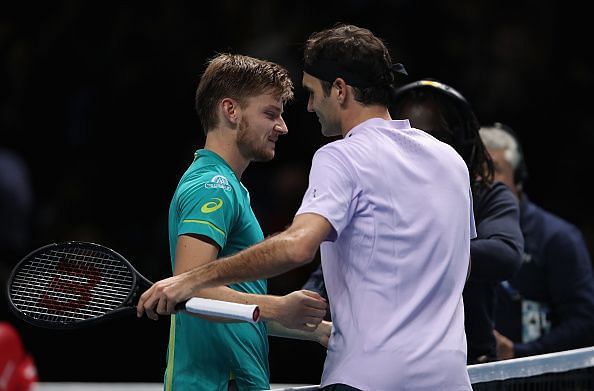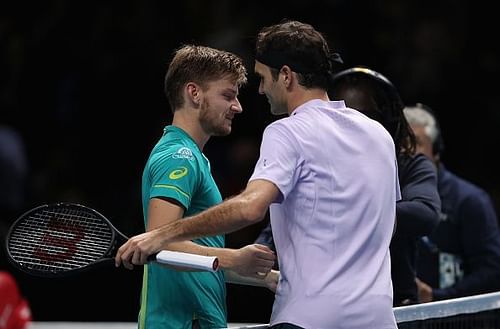
ATP Finals 2017 diary: If there's a script, Federer and Goffin clearly didn't get it

Foregone conclusion. Title on a platter. Coronation of the king.
Those were some of the phrases used, in the lead-up to this weekend, to describe how the 2017 ATP Finals felt in relation to Roger Federer. I was guilty of that too; so certain was I that Federer would lift the trophy, that I didn't even bother to turn up for his last group match against Marin Cilic.
To me, there was no need to assess his form or health going into the weekend. All he had to do was show up on the court, and everything would fall into place.
Everything did fall into place - but for David Goffin, not Federer. After being taken to the woodshed in the first set, and saddled with the knowledge that he was 0-6 against the Swiss in their six previous encounters, Goffin knew the only way he could make an impact was swing from the heels and hope for the best.
As Federer himself said after the match, "Goffin played better. That was a good plan."
The Belgian has often been relegated to the shadows, mainly because of his size. Nobody has ever doubted his ability to counterpunch from the baseline, but his slight stature has made it difficult to imagine him taking down the giants (both literal and figurative) of the game.
Like his fellow shot-making maven from Belgium Justine Henin, Goffin always seems to have to work doubly hard to keep pace with the others. But like Henin, he too has better hands and ball control than most, which he uses to manufacture winners out of nowhere.
Yesterday, he had to stretch his pace-absorbing abilities to the fullest, but he also had to do one other thing: take risks. Against Federer, you can't just make him hit an extra shot; there is no one better than the Swiss at taking advantage of a short ball. You also have to take time away from Federer by aiming for the corners, by pushing him back with the depth of your groundstrokes.
And if there's no one better than Federer at finishing a point, then there are very few better at using angles and depth than Goffin. From the second set onwards, he made a conscious decision to attack the ball rather than sit back and wait, and the results were quite stunning.
"I just think he raised his game. I couldn't follow any more," Federer said.
There is little evidence to argue against that. Goffin hit his down-the-line backhand with surgical precision, often making it land within an inch of the line. He hit his inside-out forehand with a viciousness that very few of us thought he had in him, and which seemed to take Federer by surprise too. And he served far better than you'd expect a 5'9" guy with a history of serving yips to.
Nobody in the crowd could quite believe what they were seeing. Not because the level of play was spectacularly high, but because Goffin wasn't supposed to take the game to Federer like this. Nobody expected this...except Federer himself.
"I know how well he can play, you know, in practice...I've seen this level before like today," Federer said matter-of-factly. We had seen this level from Goffin before too, but we probably forgot because it had so rarely come against the Big 3.
A couple of months ago Goffin played an astonishing brand of baseline biffing in the Davis Cup to defeat Nick Kyrgios, on a day when the Australian wasn't tanking. Seeing the diminutive Belgian belt winners all over the place, and that too on a claycourt, was a bit of an eye-opener. But it still came against Kyrgios, and not against Fedalovic (I'll keep aside his win over Djokovic in Monte Carlo for now, considering the Serb was far from his best back then), so we didn't know if he could repeat the feat when it mattered most.
Now we know. And it wasn't just the shot-making either; it was also the mental aspect of it.
When Goffin stepped up to the line to serve for the match at 5-4, the noise in the O2 arena reached a crescendo, because this seemed like the moment. The crowd wanted their idol to continue playing in the tournament, and they thought this was his best chance of coming back; with so much on the line, Goffin would surely choke.
But instead, Goffin displayed nerves of steel to close it out. He came up with authoritative serving and punishing groundstrokes just when he needed to, and refused to allow the six-time Finals champion a whiff of a chance to stage a comeback.
The season wasn't supposed to end like this for Federer. And it wasn't supposed to end like this for Goffin either (it actually won't end here no matter what happens in the final; Goffin still has the Davis Cup to play for). But in a year of throwbacks and returning to the past, this little break from tradition might well make the 2017 year-ender a little more memorable than if the usual suspects had done what everyone suspected them to do.
At the end of the day, Federer still had a terrific season, which probably explains why he was so even-keeled at his presser. He kept repeating that he was extremely happy with the season he's had, at one point even calling it 'perfect'.
But no matter how perfect Federer may have been in 2017, the semifinal in London was about something else. It was about David Goffin, and how magnificently he flipped the script to craft a result that nobody saw coming, but which everybody could appreciate.
"At the end he did play extremely well, and he was the better player on the court. I feel like it's okay like this, you know, for him to win," Federer said. "He's a great guy. I like him a lot. I think today he played so nice that he deserves to be in the finals. That's what I told him at the net, as well."
Wouldn't we all love to say the same thing to Goffin, if we could.